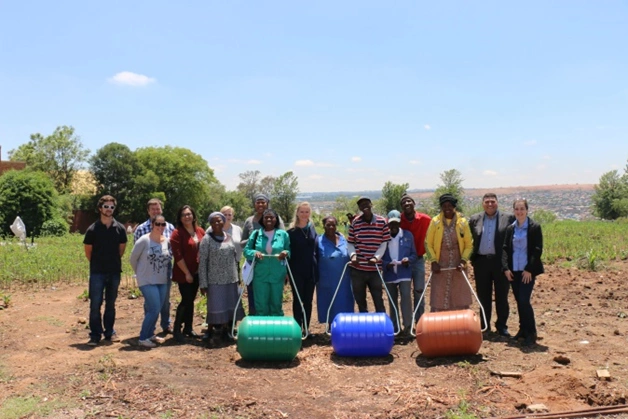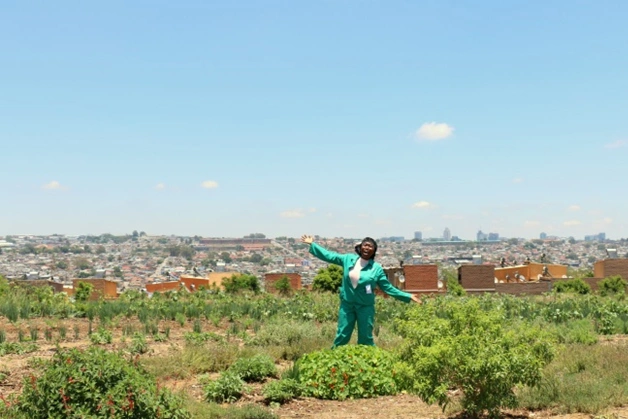Rolling out water
Only 44.4% of South Africans have piped water inside their dwelling, with most having to collect water from an outside source. Through the Women in Water programme, the Water Institute of Southern Africa (WISA) has resolved to help address the water collection challenges rural women face, and has facilitated the donation of 23 Hippo Water Rollers.
While water issues can impact anyone, the greater burden is placed on women, and the role of women in rural areas as the primary water collectors, is well known. This activity limits the productive activity of women, excludes them from income generating opportunities and, in some cases, even threatens their health and well-being. WISA’s Women in Water initiative aims to address these challenges and make a difference in the lives of rural women.
Women in Water
The WISA Water Science Division held its second annual Women in Water Conference in October, 2017 under the theme ‘Making a splash’. Ayesha Laher of WISA’s Water Science Division explains that the aim of this conference was to look outside of the traditional water sectors like water treatment and water science. Agricultural practices, which support food security but increase the demand for water, were identified as a focus area.
WISA decided to partner with Hippo Roller and asked conference attendees to sponsor Hippo Water Rollers to be passed on to recipients who were in need.
Uplifting food gardens
The Paper Manufacturers (PAMSA) and Recycling (RecyclePaperZA) Associations of South Africa met this call and donated 10 Hippo Water Rollers to Food and Trees for Africa (FTFA), a social enterprise that addresses the issues of food security and environmental sustainability.
One of these was handed over the Modimo Oteng Co-Operative in Marlboro Gardens, north east of Johannesburg, where a small group of six people, five women and one man, grow vegetables on a plot of land that was formerly a dump site. Produce is sold for a small profit at a market in the upmarket area of Sandton, while some is donated to a nearby old age home.
Another one of these rollers was donated to the Alexandra Greening route, established by Paul Maluleke as community tourism project under the Ecotourism Initiative and Department of Environmental Affairs. The project encourages members of the community to grow their own food to sustain themselves and earn an income. Maluleke said would like see more young people getting involved in these initiatives in order to pass down indigenous knowledge to future generations.
The third food garden to receive a Hippo Water Roller was the Molobanyane Co-operative in Alexandra, run by Voilet Phala Mabaso, or Mam Vi (short for Mama, or Mother, Violet) as she is known in the community. Mam Vi grows mainly herbs on a section of land shared by several co-operatives. She has grown her garden to supply produce to locals, markets and some restaurants and has even built her own drying room where she dries and pickles various produce. Mam Vi says she earns enough selling her produce to cover her living costs and pay the people who work for her. She will use her Hippo Water Roller to store water for her saplings when the water is off – something she says is a fairly regular occurrence.
FTFA will identify recipients for the remaining Water Hippo Rollers.
Hippo Water Rollers
The Hippo Water Roller Project was established in 1994 in response to the water access challenges faced by rural women and children across Africa.
The South African invention is now in use in more than 25 countries, making it easy to collect water in tough rural conditions.
The Hippo Roller holds up to five times more water than a single bucket (90ℓ) and is simple and easy to use. Grant Gibbs, Executive Director, Hippo Roller explained some of the key design elements that make the product though and user friendly:


- The clip on handle allows the Hippo Roller to be easily pushed or pulled
- A large opening allows easy access for cleaning, but is small enough to prevent small children from falling into the drum
- A small recessed cap, the size of a standard bottle cap – making it easily replaceable – allows easy water pouring
- A rounded bottom edge with a stable base allows the drum to be easily rolled upright

Community garden representatives receive Hippo Water Rollers

Mam Vi in her garden in Alexandra with the township of Alexandra behind her and the Sandton skyline on the horizon




